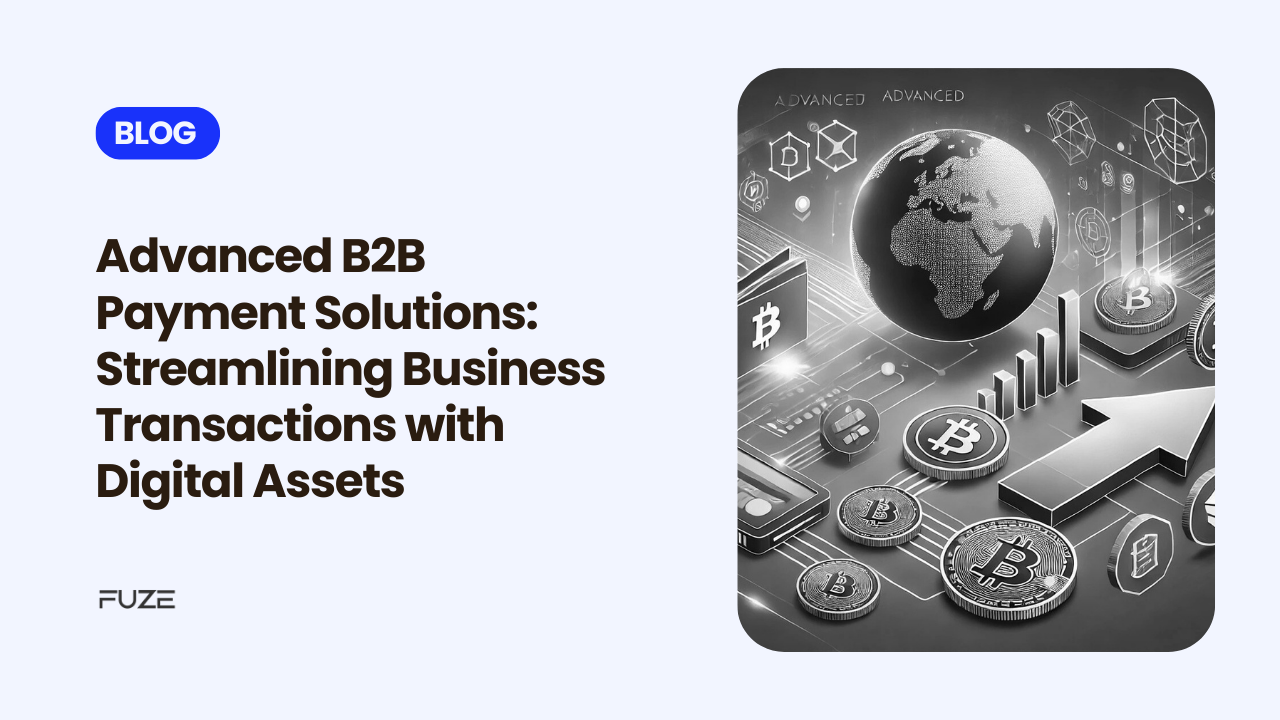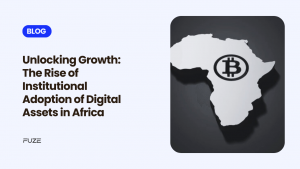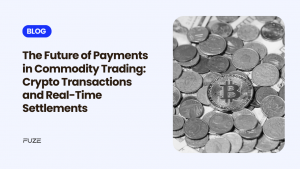B2B payment solutions are evolving at a rapid pace. With the advent of digital assets like Bitcoin, businesses now have access to faster, more cost-effective, and secure payment methods that overcome the limitations of traditional financial systems. For companies managing cross-border payments, digital assets provide a streamlined alternative, eliminating high fees, lengthy processing times, and the complexities of currency exchange.
In this blog, we will explore how digital assets are transforming B2B payments, the speed and efficiency advantages they offer, and the unique benefits Fuze’s solutions bring to global businesses. We’ll also discuss how Fuze’s platform reduces costs, enhances security, and simplifies cross-border transactions, setting a new standard for the future of B2B payment solutions.
Why Digital Assets Are Transforming B2B Payments
The traditional B2B payment model is fraught with various challenges: international transfers are slow, exchange rates fluctuate, and fees can stack up due to intermediaries like banks and financial institutions. For years, businesses had no choice but to accept these high costs and inefficiencies, especially for cross-border payments. However, digital assets are changing this paradigm. Operating on decentralised blockchain networks, digital assets like Bitcoin eliminate the need for intermediaries, allowing businesses to transact directly with each other. This not only speeds up the process but also drastically reduces fees.
Digital assets offer B2B transactions a unique set of advantages. Being decentralised, they are not restricted by time zones, national borders, or bank working hours. Payments made in Bitcoin, for example, settle almost instantly compared to traditional cross-border bank transfers, which can take days. This advantage can be crucial for businesses that rely on timely payments to manage cash flow and keep supply chains moving efficiently.
Furthermore, digital assets allow businesses to bypass the common challenges of currency exchange. Unlike traditional cross-border payments, which require currency conversion (often at unfavourable rates), Bitcoin and other digital assets are universal. Businesses can transact in Bitcoin without needing to worry about exchange rates, which brings a new level of convenience and predictability to B2B payments.
Speed and Efficiency in B2B Payments
Speed is critical in the world of B2B transactions. Delays in payment processing can disrupt operations, harm supplier relationships, and impede growth. Traditional payment methods, especially for international transactions, are slow due to various factors like time zones, banking hours, and the need for multiple levels of verification. For businesses dealing in large volumes or managing complex supply chains, these delays can be especially challenging.
Digital assets address this issue by enabling real-time transactions. Unlike traditional systems, which may require multiple days for a single cross-border transaction to settle, Bitcoin payments are nearly instantaneous. Transactions are confirmed and processed in minutes, irrespective of the sender or receiver’s location. This can be a significant advantage for businesses looking to avoid disruptions and keep operations flowing smoothly.
Reducing Costs and Enhancing Security
One of the most significant advantages of using digital assets for B2B payments is the reduction in transaction fees. Traditional payment methods, particularly cross-border transactions, are often expensive due to fees from banks, intermediaries, and currency conversion. These costs can add up significantly over time, especially for businesses that make frequent international payments.
Bitcoin transactions, on the other hand, bypass intermediaries entirely, resulting in much lower fees. For businesses looking to reduce overhead and improve their bottom line, these savings can be substantial. By integrating Bitcoin payments through Fuze, companies can minimise their transaction costs, freeing up capital that can be reinvested into growth and development.
In addition to cost savings, digital assets also provide enhanced security for B2B payments. Each Bitcoin transaction is recorded on a blockchain, creating an immutable, transparent ledger. This level of transparency and immutability offers protection against fraud, reducing the risk of chargebacks and disputes. Fuze ensures that each Bitcoin transaction is securely processed, giving businesses peace of mind and the confidence to transact with partners globally.
The Benefits of Fuze’s B2B Payment Solutions for Global Businesses
Fuze’s advanced B2B payment solutions offer global businesses a comprehensive platform that goes beyond speed and efficiency, addressing the unique demands of cross-border transactions. Designed for flexibility, Fuze enables companies to accept Bitcoin and other digital assets with ease, allowing them to transact in their clients’ “currency of choice.” This flexibility is invaluable for international businesses, eliminating the risks associated with fluctuating exchange rates and delivering a stable, predictable income stream without the need for constant currency conversions.
One of Fuze’s standout features is its seamless integration capability, allowing businesses to accept Bitcoin payments without overhauling their existing financial systems. The platform’s simple, flexible infrastructure means businesses can begin accepting digital assets immediately, streamlining adoption with minimal disruption.
As digital assets reshape B2B payments, Fuze is at the forefront, equipping businesses with the tools to leverage cryptocurrency’s speed, security, and global reach. With features like instant payments, automatic conversion, and easy integration, Fuze’s B2B payment solutions offer a seamless path for businesses to future-proof their financial operations. In an evolving global market, Fuze positions businesses for success, enabling them to harness the full potential of digital assets and stay competitive in a fast-changing financial landscape.
Conclusion
Digital assets like Bitcoin are revolutionising B2B payment solutions, offering businesses new ways to improve speed, reduce costs, and enhance security. By adopting Bitcoin for B2B payments, companies can avoid the inefficiencies of traditional banking systems and gain a competitive edge in a global market. Fuze makes this transition effortless, providing an advanced platform that integrates seamlessly with existing systems and enables businesses to process Bitcoin payments with ease.
For businesses looking to streamline cross-border transactions, reduce fees, and embrace the future of finance, Fuze’s B2B payment solutions offer an ideal solution. By partnering with Fuze, businesses can leverage the benefits of digital assets and stay ahead in an increasingly digital world. Embrace the next generation of business transactions with Fuze and unlock the potential of digital assets to drive growth, efficiency, and security.
Disclaimer: Virtual assets carry significant risks, including high volatility and potential loss of your entire investment. They are not backed by governmental protections, and recourse may be limited in case of loss. Always assess your risk tolerance, fully understand the risks, and seek independent financial advice if needed before investing.
Frequently Asked Questions
1. How secure are digital assets in B2B payment solutions?
When managed properly, digital assets offer a high level of security, utilising encryption, multi-factor authentication, and blockchain technology to protect transactions from fraud and unauthorised access.
2. Are digital assets accepted worldwide in B2B transactions?
While digital assets are gaining wider acceptance, not all countries recognize or regulate them equally. However, they are widely accepted in B2B markets and by companies operating in regions with favourable cryptocurrency regulations.
3. How do digital assets help reduce B2B transaction costs?
By bypassing traditional banking channels, businesses save on intermediary fees and currency conversion charges, reducing the overall cost per transaction, especially for high-value or frequent cross-border payments.
4. What are the main risks of using digital assets for B2B payments, and how can they be managed?
The primary risks include price volatility and potential regulatory changes. Businesses can mitigate these risks by using stablecoins or converting digital assets to fiat immediately upon receipt to stabilise cash flow.
5. What role will digital assets play in the future of B2B transactions?
As digital assets continue to gain global traction, they are expected to play a significant role in the future of B2B transactions by enabling faster, more secure, and borderless payments, positioning businesses to thrive in a digital-first economy.







